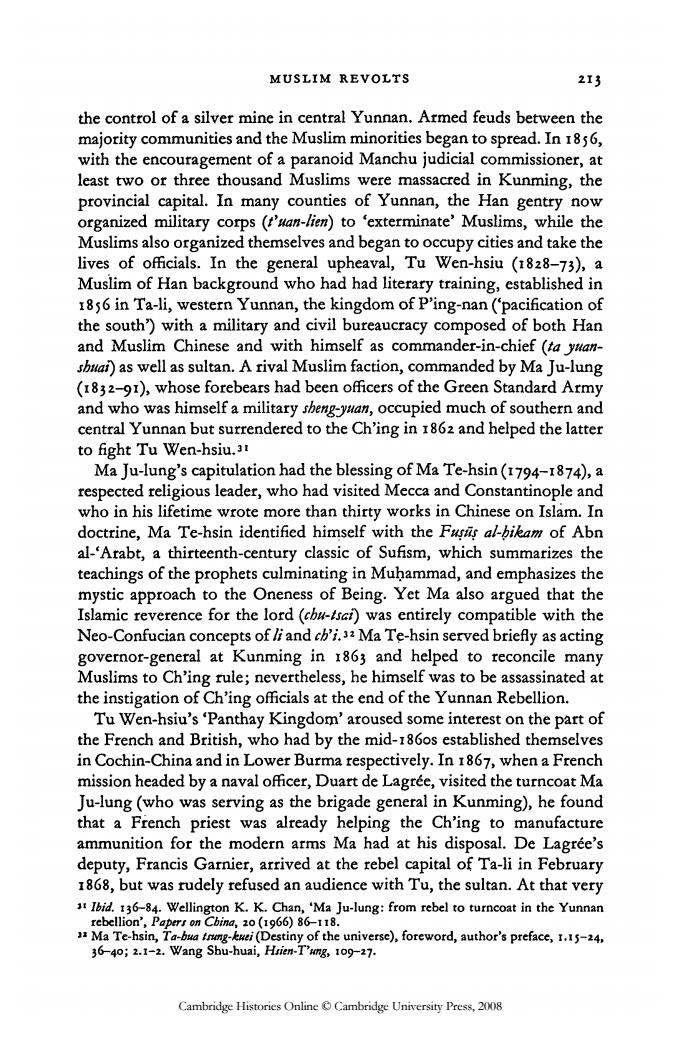正在加载图片...

MUSLIM REVOLTS 2I3 the control of a silver mine in central Yunnan.Armed feuds between the majority communities and the Muslim minorities began to spread.In 1856, with the encouragement of a paranoid Manchu judicial commissioner,at least two or three thousand Muslims were massacred in Kunming,the provincial capital.In many counties of Yunnan,the Han gentry now organized military corps (t'tan-lien)to 'exterminate'Muslims,while the Muslims also organized themselves and began to occupy cities and take the lives of officials.In the general upheaval,Tu Wen-hsiu (1828-73),a Muslim of Han background who hadhad literary training,established in 1856 in Ta-li,western Yunnan,the kingdom of P'ing-nan(pacification of the south')with a military and civil bureaucracy composed of both Han and Muslim Chinese and with himself as commander-in-chief(ta yuan- sbrai)as well as sultan.A rival Muslim faction,commanded by Ma Ju-lung (1832-91),whose forebears had been officers of the Green Standard Army and who was himself a military sheng-yuan,occupied much of southern and central Yunnan but surrendered to the Ch'ing in I862 and helped the latter to fight Tu Wen-hsiu. Ma Ju-lung's capitulation had the blessing of Ma Te-hsin(1794-1874),a respected religious leader,who had visited Mecca and Constantinople and who in his lifetime wrote more than thirty works in Chinese on Islam.In doctrine,Ma Te-hsin identified himself with the Fustis al-bieam of Abn al-'Arabt,a thirteenth-century classic of Sufism,which summarizes the teachings of the prophets culminating in Muhammad,and emphasizes the mystic approach to the Oneness of Being.Yet Ma also argued that the Islamic reverence for the lord (ch-isci)was entirely compatible with the Neo-Confucian concepts of liand c'.Ma Te-hsin served briefly as acting governor-general at Kunming in 1863 and helped to reconcile many Muslims to Ch'ing rule;nevertheless,he himself was to be assassinated at the instigation of Ch'ing officials at the end of the Yunnan Rebellion. Tu Wen-hsiu's 'Panthay Kingdom'aroused some interest on the part of the French and British,who had by the mid-186os established themselves in Cochin-China and in Lower Burma respectively.In 1867,when a French mission headed by a naval officer,Duart de Lagree,visited the turncoat Ma Ju-lung(who was serving as the brigade general in Kunming),he found that a French priest was already helping the Ch'ing to manufacture ammunition for the modern arms Ma had at his disposal.De Lagree's deputy,Francis Garnier,arrived at the rebel capital of Ta-li in February 1868,but was rudely refused an audience with Tu,the sultan.At that very a Ibid.136-84.Wellington K.K.Chan,'Ma Ju-lung:from rebel to turncoat in the Yunnan rebellion',Papers on China,20 (1966)86-118. Ma Te-hsin,Ta-bua fring-uei(Destiny of the universe),foreword,author's preface,1.15-24, 36-40;2.1-2.Wang Shu-huai,Hrien-T'ung,109-27. Cambridge Histories Online O Cambridge University Press,2008MUSLIM REVOLTS 213 the control of a silver mine in central Yunnan. Armed feuds between the majority communities and the Muslim minorities began to spread. In 18 5 6, with the encouragement of a paranoid Manchu judicial commissioner, at least two or three thousand Muslims were massacred in Kunming, the provincial capital. In many counties of Yunnan, the Han gentry now organized military corps (t'uan-lieri) to 'exterminate' Muslims, while the Muslims also organized themselves and began to occupy cities and take the lives of officials. In the general upheaval, Tu Wen-hsiu (1828-73), a Muslim of Han background who had had literary training, established in 1856 in Ta-li, western Yunnan, the kingdom of P'ing-nan ('pacification of the south') with a military and civil bureaucracy composed of both Han and Muslim Chinese and with himself as commander-in-chief (ta yuanshuat) as well as sultan. A rival Muslim faction, commanded by Ma Ju-lung (1832-91), whose forebears had been officers of the Green Standard Army and who was himself a military sheng-yuan, occupied much of southern and central Yunnan but surrendered to the Ch'ing in 1862 and helped the latter to fight Tu Wen-hsiu. 3 > Ma Ju-lung's capitulation had the blessing of Ma Te-hsin (1794-1874), a respected religious leader, who had visited Mecca and Constantinople and who in his lifetime wrote more than thirty works in Chinese on Islam. In doctrine, Ma Te-hsin identified himself with the Fusils al-hikam of Abn al-'Arabt, a thirteenth-century classic of Sufism, which summarizes the teachings of the prophets culminating in Muhammad, and emphasizes the mystic approach to the Oneness of Being. Yet Ma also argued that the Islamic reverence for the lord {chu-tsai) was entirely compatible with the Neo-Confucian concepts of//and cb'i.32 Ma Te-hsin served briefly as acting governor-general at Kunming in 1863 and helped to reconcile many Muslims to Ch'ing rule; nevertheless, he himself was to be assassinated at the instigation of Ch'ing officials at the end of the Yunnan Rebellion. Tu Wen-hsiu's 'Panthay Kingdom' aroused some interest on the part of the French and British, who had by the mid-1860s established themselves in Cochin-China and in Lower Burma respectively. In 1867, when a French mission headed by a naval officer, Duart de Lagre'e, visited the turncoat Ma Ju-lung (who was serving as the brigade general in Kunming), he found that a French priest was already helping the Ch'ing to manufacture ammunition for the modern arms Ma had at his disposal. De Lagree's deputy, Francis Garnier, arrived at the rebel capital of Ta-li in February 1868, but was rudely refused an audience with Tu, the sultan. At that very " Ibid. 136-84. Wellington K. K. Chan, 'Ma Ju-lung: from rebel to turncoat in the Yunnan rebellion', Papers on China, 20 (1966) 86—118. 31 Ma Te-hsin, Ta-bua tsung-kuti (Destiny of the universe), foreword, author's preface, 1.15-24, 36-40; 2.1-2. Wang Shu-huai, Hsicn-T'ung, 109—27. Cambridge Histories Online © Cambridge University Press, 2008